Anoush Anderson discovered a love for science when she was young, and her curiosity about the workings of the world motivated her to pursue an education and career in the sciences. She recently completed her PhD in Biochemistry and Molecular Genetics. Taking a scientific approach to life, Anoush has felt empowered to try new things and to see what grows. She has been inspired by her Armenian ancestors who took charge of their destiny despite adversity, and has found a connection to her roots through her love of knitting. Finding that God will work with her in her choices, Anoush has learned to be open to new experiences and possibilities.
Tell me a little about yourself.
I was born in Salt Lake City, Utah. My dad is Armenian and immigrated to the United States when he was about seven years old. His family joined the church in 1893 in Turkey and had suffered a lot of persecution, so when they were able to immigrate as religious refugees they really had no desire to be anywhere other than very close to church headquarters. They moved to Salt Lake because they thought of it as Zion. He lived in Salt Lake most of his life and studied Electrical Engineering and Computer Science at the University of Utah.
My mom grew up in Virginia and Georgia and was more or less raised peripheral to the Church. Her childhood was fraught with difficult family situations and poverty, and she saw the Church as a way to escape that. Her father had a fourth grade education so she wasn’t raised in an educated household, and education was something she thought could change her life and help her get out of this negative cycle she saw her family in. She found a way to go to BYU and it made a huge difference in her life trajectory. She moved to Salt Lake after graduating and was an elementary school teacher. She met my father in a singles ward in Salt Lake.
I grew up in Salt Lake and Centerville, Utah, and lived there until moving to Virginia for graduate school soon after I was married.
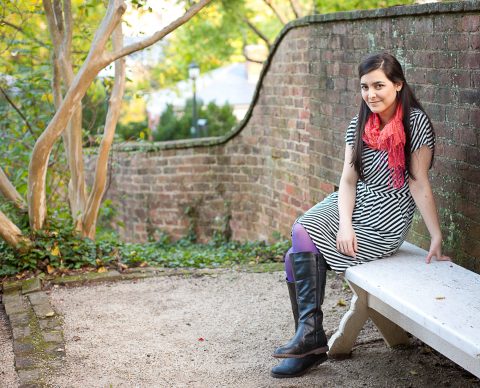
Anoush on the UVA grounds
Your heritage is so unique. How do you stay connected to it?
I don’t read Armenian and I don’t speak Armenian fluently, so I can’t do a lot of specific research. At the same time a lot of records of the area were destroyed, as happens when people are conquered. But we have a strong tradition of stories in our family. Over and over again we’re reminded of the blessings we’ve received because of the gospel of Jesus Christ. And my grandmother always says “Thank God for the gospel! Thank God for the Church!” and how grateful she is that it keeps us together as a family. It has become such a blessing in her life, especially living in the United States where she feels safe and able to freely worship.
I think about the persecution my ancestors suffered for being members of the Church. The Church of Jesus Christ of Latter-Day Saints was, especially in the late 1800’s but probably even now, very much perceived as being an American church. When my family joined the Church they were seen as turning their backs on their heritage, because Armenians have been Christian for so long that it’s their identity. Mormon Armenians talked about themselves as the last to be hired and the first to be fired from a job. It was so difficult to maintain work that the branch got together and decided they needed to start their own kind of business. If they could just work together, themselves, they wouldn’t have to deal with other people hiring them and firing them and deciding if they could eat or provide for their families. I appreciate that story—that ability to take charge of one’s destiny and work under adversity.
When did you first discover your interest in science?
In seventh grade, half a year of science was required and if you wanted you could take a full year. For some reason I decided to take a full year of science and that class was awesome. We got to do things like dissect frogs and earthworms. I remember acting out the parts of the cell—I was the mitochondria, which was the cool part—and learning how the cell fit together that way. From then on I always took a science class.
In high school, I went on a field trip with a bunch of other guys from my physics class to the University of Utah Physics Department. A gentleman from the physics department talked to me and got to know me—he was actually the administrator of a scholarship for women in science at the University of Utah. He really encouraged me to apply for it. Applying for and accepting that scholarship put me on the road to studying science.
I don’t know why I gravitate so much towards the sciences except that I like understanding how the world works. That’s what drew me towards Physics, especially mechanics. How does the world work? How do forces function together to create the world that we interact with? I have the same curiosity about biology on a microscopic scale. How does your body work at a cellular level? What is DNA and how does that create the person that you are? How does the human genome create the huge diversity we see in the human race despite it being 99% identical across all people? It’s that curiosity that drives me.
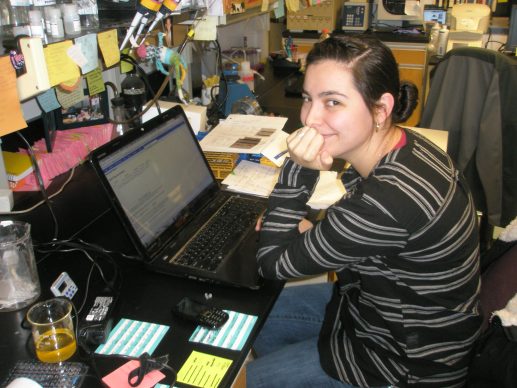
Anoush at the lab, getting her dissertation ready.
Did you feel supported and encouraged in your interests?
I’ve tried to think about why I am the way I am, why I felt enabled and empowered to study the things I did and I’m not sure, except that my parents both always thought that education was important. My parents did encourage and helped me feel enabled to do whatever I wanted to do. In everyday tasks I didn’t see any gender distinction. I have two younger sisters and there weren’t any boys in my family, so if something was to be done by one of the kids you couldn’t choose one group over the other. So I grew up doing all the things. And I guess I just never thought there was something that I couldn’t do.
That is such a gift.
It really is, and I don’t know how that stuck. There are definitely choices that I make in my life that are not the same choices my mom would make in my position, for example. But somehow I’m still able to confidently make those choices for myself. And I’ve thought about this a lot. I have worked with the Young Women, and I wish I could figure out how to pass it on. How can I help you, as another person, feel that you can achieve whatever you want? Or at least that you have support to pursue your interests? I don’t like to see people limited by stories—stories from their parents, society, from themselves, or what they think the Church is telling them.
What was your undergraduate experience like?
My freshman year of college I received a scholarship that placed me in a research lab that was a really good fit. I ended up staying in that research lab throughout my four years at the University of Utah. In that lab I learned what it was like to do science—not just to read science and see what other people have done—to have hypotheses and test them with experiments and to reevaluate your conclusions and to do things that are really hard.
I remember one specific experiment I was trying to do required me to dissect zebrafish embryos—they are super small; you have to do it under a microscope—and I was using little insulin syringes as my tools. I was having a really hard time dissecting the embryo from the little yolk of the egg. I was just so frustrated, and it was taking weeks with little progress, and I was not enjoying it. I complained to the post-doc supervising my work, and said “This is just really hard. Things are not usually this hard for me!” He just laughed and said, “Now you know how everyone else feels!” I think this was one of the first times that I failed at something. And that’s important—in learning what research is like, and what science is like, and what life is like. Things are not always going to be easy, but when I figured out how to do it? Yes, I was proud of it. Yes, I was willing and excited to do it.
What was your emphasis of study at the University of Utah?
I started out studying physics because I was interested in physics and I’d visited the physics department while in high school, but I was also interested in genetics. I went and talked to the biology advisor, and he said “You can’t do genetics with a physics degree” (not true—there is actually a whole field of biophysics). And so I said, well fine—I will just do both! So I received two bachelor degrees. I liked them both enough that I was enjoying my classes. It was kind of funny because my mom would always require us to take a “fun” class every semester, and I was like, “These are fun classes!”
Did you go straight to graduate school?
That was a tricky decision because I always wanted to go on a mission. And I did have a little bit of a conflict in trying to decide when to go on a mission. I had an interesting experience when I was 20 years old that helped me decide when to serve. I visited Temple Square and sat at the Christus listening to the narration and thinking. In between groups a sister missionary came over and started talking to me. I asked her “How do I know when I should go on a mission?” And she said “Maybe you should go when God wants you to go.” And it was like “Bing!” A lightbulb came on, and I thought “Oh, He might care? You mean that might make a difference? Who knew?” (Laughs.)
A series of events in my life led me to know that I needed to finish my degrees first. So I put in my mission papers halfway through my last semester of college and soon after graduating I served in the Washington Kennewick Mission. The last 3-4 months of my mission I had permission to apply to graduate programs.
At that point, I didn’t have a mentor to guide me to a university or a good grad program. I had half an hour of extra computer time on P-day. So I googled some things and pretty much thought, “What are some states I’d like to live in? Of these states, which schools have a genetics program?” and I left it at that. I applied for something like 6-9 schools and when I returned home I got interview offers for 5 or 6.
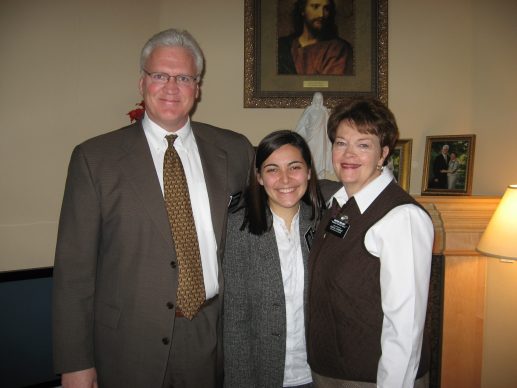
Anoush with her mission president and his wife
By the time I was almost done with interviews I was seriously dating someone I’d known since high school. We’d been friends the whole time and knew each other quite well. And I was having a hard time making any decisions about our relationship and about graduate school. I really appreciate that Ben has always supported me in whatever I wanted to do. So when it came down to trying to decide which school to choose, he straight up said “You choose. You need to do what’s best for you.” I think he wanted very much to be part of my life, but we weren’t married and we weren’t even engaged, and he wanted me to make the decision without any extra concerns. He wanted me to be very happy with my decision. Once I was able to decide, it seemed that the decisions went together: I wanted to marry Ben and I wanted to go to the University of Virginia.
How did the process of making these decisions look and feel to you?
I had a lot of anxiety and frustration thinking about the next steps in my life and I was talking to friend on the phone. I’m a very verbal processor, and as I was talking it out, it sort of clicked. “I think these are the two things I want! I think I want to marry Ben and I think I want to go to the University of Virginia.” I told Ben and he was a little like, “Wait a minute—we were talking about you moving across the country, so…can I process this?” (Laughs.) I was like “Sorry, I thought you’d be all on board with this epiphany!” But things just felt calm all of the sudden. I wasn’t anxious anymore, or second-guessing, and things felt comfortable moving forward. And I think that goes a long way, for my personality, in helping me know that Heavenly Father is with me.
I hesitate to say that Heavenly Father approves of my choice of graduate school, for example, because I’ve gotten to a point in my life where I really feel like we don’t have right or wrong choices in our life. We’re here to make choices and experience life. And God will be with us in those choices. I’m sure there are any number of places that I could have gone to graduate school that would have been just fine for Ben and I, both. I feel like God is big enough to make all of those things work. And I appreciate being able to make a choice and feel peace that my effort and my offering is acceptable to God, especially because I feel like I’m taking a non-traditional path. I talk to family members who maybe don’t understand the decisions that I’ve made in regards to my education and my career, my passion for science, and other life choices. But I can say this is a decision I made with my husband and with God and I can feel good about that. And I don’t have to worry about what other people say, or think, or wish I had done, or have regrets about my life. I don’t have these regrets because I’ve been able to feel that calmness and reassurance.
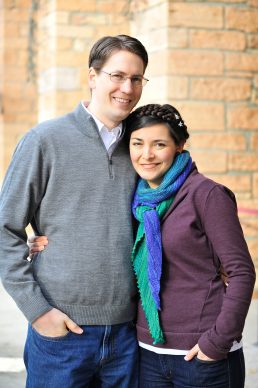
Anoush and her husband Ben
In what ways did you see God help make your decisions work?
Even though I chose UVA based on my own personal interests and inclination towards the area, it turned out really well for us as a couple. As it turned out there was a place here that Ben was able to work at. It’s hard to get a job in a college town, and it’s hard to get a job when your skill is “I speak Arabic.” But he was able to find a job nearby, which we didn’t necessarily think was going to work out. We felt really guided to this area, to be able to have the opportunities that we’ve had through work, and school, and in the church, and in participating in the ward here in Charlottesville.
I think it’s easy to see how things fit together in retrospect. It was the little coincidences, like that Ben’s uncle lives twenty minutes outside of town and they’re happy to interact with us even though they haven’t really been part of his life for the past 25 years. Or that when I randomly decided I might like to live in Virginia, I chose this one university in Virginia to apply to, and the first lab I rotated in had this professor that has a really non-traditional perspective as to the way he runs his lab. He was low-key enough that I felt like I could do what I wanted to do to take care of my home and myself—and also successfully defend a PhD. It feels almost miraculous that I could feel fulfilled in a graduate program and that Ben could find a place to work without having a huge commute. When we came here for grad school I said to him, “You can choose where we live next!” but his job has been fulfilling enough that when I graduated he said he wanted to stay here.
What have you learned about yourself and about God in your studies and in the lab?
I think science, and knowing that God follows natural laws, gives me permission to have questions and not need immediate answers. Any graduate student will tell you that this is the thrill and bane of their existence—having a question and not being able to find the answer no matter what experiment you perform. Accepting that uncertainty in my academic pursuits gives me permission to have uncertainty in the gospel, without any trouble. I know that’s not the same for everyone, but for me, that’s how my mind deals with uncertainty. That doesn’t mean I just ignore it or leave it alone. Obviously as a scientist you’ll do experiments, think about it, research your question—but it doesn’t make you not believe in science anymore. Or quit science and go do something else. And so for me, that aspect of science has helped me give my gospel learning time and space to grow.
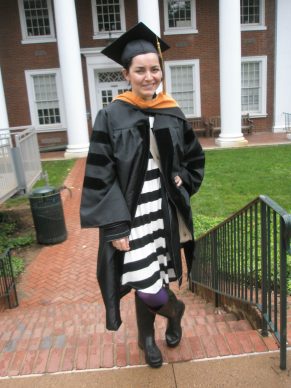
Anoush upon graduating from UVA with her PhD.
As a scientist, is it exciting to have some questions unanswered?
I do think that most of these questions will be answered after this life, and I’m thrilled to have some questions answered. They’re probably not the same questions most people have! There are things I want to know about the creation of this world, and God’s purposes, and how he’s dealing with certain things. I think I have a lot to learn about the Atonement, and I’ve been developing a new understanding about the choices we make: if you must gauge your choices, gauge them based on how effective they were at reaching a goal. That way you can guide your choices because you know what your goal is, without making that judgement of, “You did it wrong.” If I miss my goal, my decision wasn’t effective—and that’s ok. Now I can do something different to course correct. This feels healthier than the right or wrong paradigm I was raised with. I’m more able to make choices and experience life when I give myself that permission, when each choice I make does not have the pressure of being right or wrong.
That is something I learned about myself soon after grad school. After I defended my dissertation, my research ended quite abruptly because of a lack of additional funding. And so I found myself without a job, and really not very many options for employment. I had to try very hard to find other things that were healthy and effective to do with my time, to not get too depressed. What do I do with the rest of my life? How am I supposed to choose what to do next if all I know is what I don’t want to do? Well, I’m going to have to try some things. And that has been really eye-opening in helping me become a more peaceful, less anxious and a more growth-minded person.
I’ve always tended toward anxiety and I think it’s very helpful to have God say to me “Anoush, whatever you choose will be fine—I can work with that. I just want you to be happy. I don’t want you to feel like I’ve forced you to do something. I don’t want you to feel like I forced you to go to grad school and I don’t want you to feel like I forced you to marry this person. I don’t want you to feel like I forced you to stay in this town or to make these choices about your family. You make those choices and we can work on this together.” And I appreciate that because I haven’t always had this perspective of God.
Do you have new goals set for yourself, or are you in that experimental mode right now?
When you go to graduate school, usually they are training you to be a mini version of your professor. And since that is not the job I am choosing I get to try new things. Knitting is another passion of mine, and I have worked at a local yarn store here in Charlottesville. The yarn store was a dream job because I pretty much got paid to knit all day, and to talk to people about yarn and knitting. I was able to sort of diversify my experiences enough to say, yes, I still want to do science! I’m still really interested in that type of career.
When did you start knitting?
Knitting, and crocheting, and sewing, and anything I do with fiber really connects me to my heritage. That was something my grandmother and her sisters did a lot. They interacted with fiber all the time, so much that it’s completely second nature to them. I feel like that’s a connection to my ancestry as well—that I make things. My grandmother’s family in the Middle East tied knotted rugs as a profession. Within the branch they prepared the fiber into yarn and dyed it and designed the charts for the rug patterns. They built the loom and strung it and tied the knots and then took the rugs to sell at the market. For fun at night, my grandma and her sisters would do Armenian needle lace which is a very fine, delicate lace.
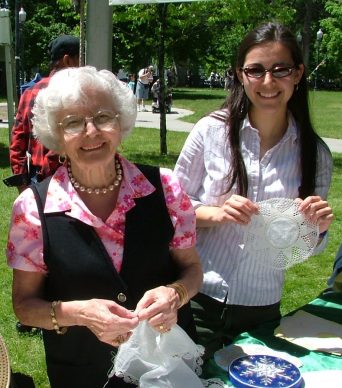
Anoush and her grandmother demonstrating Armenian needle lace at the Living Traditions Festival
When I was about seven years old my grandmother taught me to crochet, and I crocheted all the time. I would usually crochet small things like dish cloths, little purses, long strips of nothing, and afghans. When I was sixteen my mom decided I needed to learn how to knit and my aunt taught my sister and I. After that knitting was something I knew how to do, but I still preferred to crochet.
In my last area on my mission, my companion was sick and she was trying really hard to get better without having to go home. We spent a lot of time that transfer in the apartment and I started knitting a little more and playing around and teaching myself some new techniques.
Elder Uchtdorf has talked about how women have a need to create and it’s part of our divine nature, to create and in that way be like God. I feel very fulfilled in creating in this way. It tones down my anxiety and also helps me to serve others. I love to make things for myself and others and I appreciate the artistic balance it gives my logical, scientific mind.
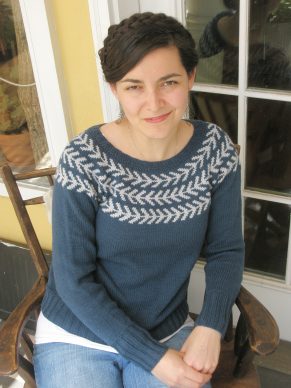
Anoush modeling some of her knitting
Any last words of wisdom you would like to share?
If you are curious about a path, try it out. In Alma 32 we read about the fruit of the gospel and the recommendation to try it, or plant the seed—see if it grows, see what it gives you. Try it out! I think it’s so hard when we teach people to have life goals as if they were endpoints. It’s so hard to be open to the possibility of changing your mind. It doesn’t have to mean that you weren’t following the Spirit. It doesn’t have to mean you made a wrong choice. It means different things are right for you in different situations.
I admire people who can say, “This is what I used to want, and I honor that, and now I want something different, and I honor that.” I don’t have to be a paleontologist because that is what I wanted to be when I was five. I can change my mind. I think it’s harder for us when we’ve invested a lot in it. My mom can say “When you were a kid you wanted to be a stay at home mom” and I can say you’re right, I did. And I think I changed my mind. And maybe I’ll change my mind again someday but for right now, that’s not what I want. And maybe someday I will. I’m open to all possibilities.
At A Glance
Name: Anoush Emrazian Anderson
Age: 34
Marital History: Married 10 years
Occupation: Scientist
Schools Attended: University of Utah, B.S. Biology, B.S. Physics, 2006; University of Virginia, PhD Biochemistry and Molecular Genetics, 2016
Languages Spoken at Home: English, Armenian
Favorite Hymn: Reverently and Meekly Now
Interview Produced by Courtney Scott Buer
